The Irish chameleon Brian O’Nolan is best known by the sobriquet Flann O’Brien, under which he wrote comic masterpieces like “At Swim-Two-Birds” (1939) and “The Poor Mouth” (1941). “The Short Fiction of Flann O’Brien” (Dalkey Archive, 159 pages, $14.50) mixes full-throated social satire with narrative high jinks. But the foremost work in this collection is not short, but sadly truncated. O’Nolan was working on the hilarious novel “Slattery’s Sago Saga” when he died in 1966. In it, a wealthy and blithely bigoted American has come to Ireland with the intention of buying all the farmland and replacing the potato crops with the hardier sago tree. This, she tells the dumbfounded narrator, will prevent a second potato famine and so protect against “another invasion of the United States by the superstitious thieving Irish.”
O’Nolan takes many identities in this gleeful miscellany. There are five brief sketches written in Gaelic (and translated by Jack Fennell) under the pen-name Brian O Nualláin that satirize Ireland’s reluctant Anglicization. The presciently postmodernist story “Scenes in a Novel” is by “Brother Barnabas”—here a writer discovers that his recalcitrant fictional characters are scheming to mutiny and overthrow him from the position of author. Three vignettes follow from Myles na gCopaleen (the handle O’Nolan used for his legendary “Cruiskeen Lawn” column at the Irish Times). One of them, “Drink and Time in Dublin,” is the po-faced transcription of two barflies recounting an epic bender. “It’s funny, finding out about the day,” one muses. “You can’t stop a man in the street and say have you got the right day please?”


